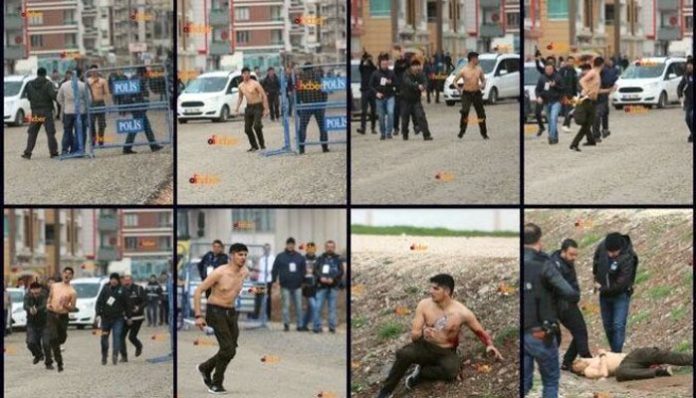Photojournalist Abdurrahman Gök, who took a series of photographs showing a university student being shot to death by a police officer during Nevruz celebrations in Diyarbakır in 2017, has told the story behind the photos to Deutsche Welle Türkçe.
“It all happened in a minute. I was taking photos as if I were hypnotized,” Gök said Wednesday in describing the 28 photos he took as the 23-year-old Kemal Kurkut was killed by a police officer, adding that he only dragged himself from the scene after he was pushed away by an officer.
The journalist lied and said he forgot to insert a memory card in the camera when he was asked by the police officers, who wanted to prevent the public from seeing the killing, to give them the photos of the incident.
“I lied to them so I could save the photos,” Gök told DW, explaining that he kept the memory card in his back pocket until he left the scene.
The Diyarbakır 7th High Criminal Court on Tuesday acquitted the police officer, identified only by the initials Y.Ş., who was facing three to nine years in prison for causing the death of Kurkut by negligence.
Gök, on the other hand, was charged with “membership in a terrorist organization” as well as “disseminating terrorist propaganda” as part of an investigation launched three years after the incident.
The photos from Gök’s camera were crucial in refuting claims made by the Diyarbakır Governor’s Office following the incident that Kurkut had been shot on suspicion of wearing a suicide vest.
They showed a bare-chested Kurkut approaching a police checkpoint with a knife and a water bottle in his hands, then running past police barricades with several officers chasing after him before finally getting shot in the back and falling to the ground.
According to eyewitness statements, the young man had argued with the police at the checkpoint and was asked to remove his upper clothing. “I don’t have anything on me,” Kurkut reportedly shouted angrily before taking off his sweater, running to a nearby butcher’s shop to grab a knife and coming back the scene of the incident.
“Those photos went down in history proving Kemal’s innocence. If it weren’t for them, Kemal would be known as a suicide bomber who was about to engulf the Nevruz celebrations in blood when he was killed,” Gök told DW Türkçe, reportedly with tears in his eyes.
The journalist said he relived the moments when he had cried after looking at the photos later the same day they were taken after hearing about the recent acquittal of the police officer charged with killing Kurkut, wishing that he wasn’t the one who took those photos because it was too heavy a responsibility.
“Those photos showed us how easy it is to destroy young people’s lives [in Turkey]. Both the killer and the victim were in the same shot. Despite this, the case ended with no punishment of the police officer involved, like many others before him.”
According to DW, Gök received death threats on social media soon after releasing the photos and feared that his family members might get hurt. He reportedly refused to follow his friends’ advice at the time that he should go abroad and chose instead to continue doing journalism in Turkey.
Gök’s house was reportedly raided twice by police following Kurkut’s killing, and three separate investigations into him resulted in a decision of non-prosecution. However, he was recently charged with terrorism based on phone conversations with colleagues and his reporting, which had nothing to do with Kurkut’s death.
Awarded two prizes for the pictures he took of Kurkut’s killing, the journalist says he has no doubt that they are the reason he is still being oppressed.
“I’ve been doing journalism for 16 years and had not been investigated this thoroughly or oppressed this much until I took those 28 photos. There’s no other explanation for it. The police officer’s acquittal in the Kemal Kurkut case, while I face up to 20 years in prison, is the clearest picture of today’s Turkey.”
Referring to President Recep Tayyip Erdoğan’s recent pledges of economic and judicial reforms that are meant to restore investor confidence in Turkey’s battered economy, the Turkey Human Rights Foundation (TİHV) Secretary-General Coşkun Üsterci on Tuesday said it is not sincere to speak of reforms when the Kurkut case ends in a lack of punishment, which encourages security forces to overstep their legal bounds.
Human Rights Association (İHD) Diyarbakır branch chairman Abdullah Zeytun also criticized the police officer’s acquittal, saying that it “paved the way for the death of other Kemals.”



